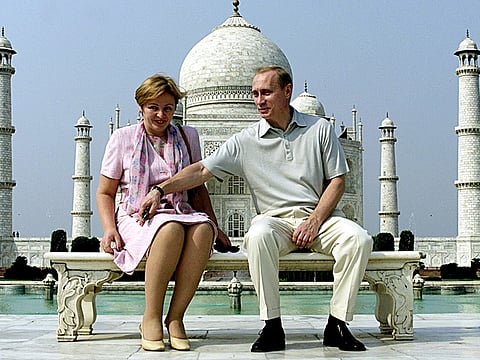KGB officer to global leader: Who is Russian president Vladimir Putin?
Putin, now considered one of the most powerful men on earth, came from humble beginnings

Vladimir Putin, 65, who extended his long rule to 2024 in Russia's presidential election on Sunday, has re-imposed the Kremlin's grip on society since taking power 18 years ago after a lawless but relatively free decade following the demise of the USSR.
Putin has been in power, either as president or prime minister, since 2000. He is the Kremlin's longest-serving leader since Soviet dictator Joseph Stalin.
A KGB officer turned world leader, Vladimir Putin has dealt with three US presidents, thrusting Moscow into a new rivalry with the West by snatching Crimea from Ukraine, and launching a pivotal and controversial intervention in Syria. The Russian leader rules unchallenged even as the Russian economy stagnates after the longest recession in two decades.
Strong and invincible
Named the world's most powerful person by Forbes for the past four years running, the judo black belt carefully nurtured his image as a powerful leader with photo opportunities showing him riding topless on horseback in the Siberian wilderness and darting an endangered tiger.
A post-Soviet tsar
Buoyed by an influx of petrodollars that saw living standards soar, the Kremlin under Putin forged its own ‘sovereign democracy’. This brought on a phase where the trappings of having political pluralism or diversity of political thought, such as political opposition and civil society, were effectively destabilised.
Supporters laud him as a saviour who restored pride and traditional values to a humiliated nation. Foes, however, assert that Putin has dragged the homeland further from democracy, and stoked nationalism in a bid to restore Moscow's lost empire.
Putin has promised to use his new term to strengthen Russia's defences against the West and to raise living standards.
International influence
Putin, who once decried the collapse of the USSR as the “greatest geopolitical catastrophe" of the 20th century, has ferociously defended Moscow's sphere of influence and also challenged perceived US dominion.
When crowds in Ukraine ousted Russia-backed leader Viktor Yanukovych in February 2014, the Kremlin faced losing its dominance over a key neighbour. Within days, Putin ordered special forces to seize the strategic Crimea peninsula and -- after a hasty referendum rejected internationally -- in March 2014 signed off on the region's annexation.
The redrawing of Russia's border sparked the worst standoff with the West since the Cold War and unleashed a wave of nationalism at home that saw Putin's popularity soar. Soon, however, the Kremlin was accused of masterminding a rebellion in east Ukraine that turned into a festering conflict that has cost more than 10,000 lives.
Despite sanctions pushing his economy into recession, Putin also launched a bombing campaign in Syria to support leader Bashar al-Assad in 2015. It is widely seen as the key factor that tipped the war in Assad's favour.
After Donald Trump's shock election win, US intelligence accused Putin of ordering a hacking and influence campaign to get Trump to the White House. "Those that lose always look to blame someone else," Putin retorted.
Putin's life in years
October 7, 1952: Putin is born in Leningrad
Putin was born into a working-class family in Leningrad -- now Saint Petersburg -- on October 7, 1952 and cut his teeth in the city's rough-and-tumble neighbourhoods.
"The Leningrad streets taught me one thing: if a fight is unavoidable, you have to hit first," Putin said in 2015.
He fulfilled a childhood dream by joining the KGB intelligence service, getting posted in 1985-1990 to Dresden in what was then East Germany when Soviet power was crumbling.
His political rise began after he returned to work at Saint Petersburg city hall under his mentor, liberal mayor Anatoly Sobchak.
Two decades later, Sobchak's daughter Ksenia challenged Putin in the election -- a move that divided Russia's already deeply split liberal opposition.
1998: He is named head of the FSB security service
By 1996, he was called to Moscow to work in the Kremlin under Russia's first democratically elected president Boris Yeltsin, who in 1998 made little-known Putin head of the KGB's successor, the FSB.
1999: Boris Yeltsin's prime minister
Battling health and drinking problems, frail Yeltsin in August 1999 named Putin prime minister and his popularity shot up as he oversaw the launch of a second war to crush rebels in the Chechnya region.
When Yeltsin sensationally resigned on New Year's Eve 1999, Putin suddenly took over as president of the biggest country on Earth.
2004: He is re-elected as president
2008: Putin steps in as Prime Minister
In line with a constitutional limit, at the end of his second term Putin hands power to his protégé Dmitry Medvedev and becomes prime minister.
2012: Becomes president amid tension
He returns as president, for a term extended from four to six years, amid unprecedented opposition protests.
While the demonstrations petered out after a police crackdown, the spectre of unrest spurred tough new measures to eradicate dissent.
2013: Divorce
After three decades of marriage, he divorces Lyudmila with whom he has two daughters.
2014: Crimea annexation
He annexes the Ukrainian peninsula of Crimea, sparking the worst diplomatic crisis between Russia and the West since the Cold War.
2015: Intervenes in Syria
Gives military backing to the regime of Syrian President Bashar al-Assad.
2017: Decides to run again in presidential elections
In December, he announces he will seek a new six-year term as president in March 2018.
2018: Re-elected to rule until 2024
Putin is re-elected for his fourth term as president in a landslide victory in March.
Putin in pictures
- With inputs from agencies
Sign up for the Daily Briefing
Get the latest news and updates straight to your inbox


